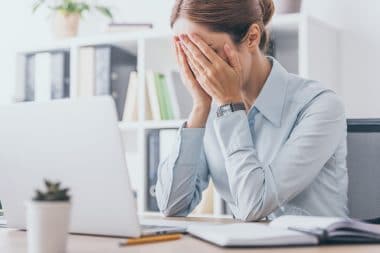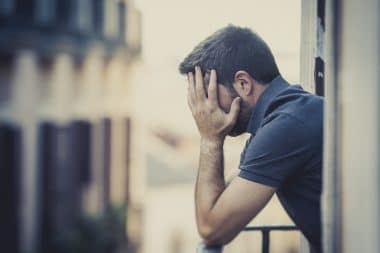Anxiety is the uneasy feeling of nervousness that comes with the worry that something unfavourable could happen. Given this definition, it is obvious that anxiety is an occurrence that most people experience once in a while due to certain events. This article will provide insights on why some people get anxiety and the causes of anxiety disorders.
Anxiety Disorders
Anxiety disorder is a clinical term referring to situations where a person feels unusually and excessively stressed, worried, nervous, restless, unsettled, and easily triggered by almost any given situation.
Anxiety disorder symptoms occur more frequently than the normal bouts of anxiety. Symptoms of anxiety disorders include excess worries and fears, irritability, fatigue, difficulty in sleeping, mood swings, difficulty in concentrating, forgetfulness, etc.
Types of anxiety disorders include post-traumatic anxiety disorder, social anxiety disorder, generalized anxiety disorder, separation anxiety disorder, excessive phobias, etc. Often, therapy for anxiety is considered the best option for treatment, although medications can also be recommended.
Causes of Anxiety and Anxiety Disorders
-
Environmental Factors
Environmental factors are considered the most common causes of anxiety and anxiety disorders these days. As you go about your daily activities, diverse happenings and situations might threaten your inner peace. It could be a traumatic event or an unforgettable experience that triggers anxiety.
For instance, psychologists found out that the 9/11 incident caused fear and borderline anxiety disorders in children and teenagers who were aware of the unfortunate event at the time.
You might also feel stressed or even scared by COVID-19, the subsequent lockdowns and stay-at-home orders that ensue, and the economic breakdown that the whole situation has brought about.
It might even be the stress and strain of trying to keep up with high grades in school or being super productive at work that would make you feel anxious.
As you go about your daily life, many things would creep in to make you feel anxious. A serious family emergency, financial strains, or something else could make you feel worried and scared. How you handle these situations determines whether you overcome anxiety, or it becomes a disorder.
-
Medical Factors
Aside from environmental factors, medical factors are the second leading cause of anxiety and anxiety disorders. There are diverse health conditions and health problems that could trigger anxiety or related conditions.
Brain-related health problems are particularly believed to induce anxiety. This is due to chemical reactions that are sent to the brain caused by threatening situations, which then trigger anxiety-related actions. Thyroid-related health issues may also bring about anxiety and similar conditions. Hormones could cause anxiety.
Moreover, having severe health problems can stress a person out and make him worry, triggering anxiety or develop anxiety disorders. For instance, being told that one has cancer or another serious health problem can trigger anxiety.
The thought of seeking painful treatments, experiencing pain, or being restricted of one’s movement, could also make one feel highly nervous, stressed, and scared.
Furthermore, the use of some medications and treatments can trigger anxiety and anxiety disorders. It’s advisable to check with your therapist before taking in any pills.
-
Genetic Factors
People’s genes are created and programmed differently. This shows in how two people can have shockingly contrasting reactions toward the same event.
These differences may be a result of genetics and differences in perceptions. For example, two colleagues at work can have similar presentations, yet only one of them feels excessively anxious.
Genetically acquired anxiety disorder refers to inherited genes, chromosomal, and brain structure characteristics that have inherent traits of anxiety in them. According to a 2015 study, if one’s relative has or had anxiety disorders, there is a great likelihood that some other individuals in that family will have anxiety or anxiety disorders as well.
Knowing your family history will help both you and your therapist get to know the root cause of your anxiety disorder on time, especially if you don’t know what’s behind your undue bouts of anxiety.
-
Use Of Or Withdrawal From Use Of Substance
If you are not familiar with the use of substances such as opioids, alcohol, cocaine, and the likes, you would most likely feel off using it for the first time. In fact, for the period in which it remains in your system as a first-timer, you might feel restless, anxious, and panicky.
This is because your body is reacting to the unfamiliar substance that was introduced to it. Even after the first usage, some people report that they still feel anxious and panicky on more occasions after using.
Similarly, anxiety is one of the most common symptoms people experience after withdrawing from the use of substances, intoxicative or not. The symptoms that trail the withdrawal are similar to those people experience after taking substances for the first time.
Most times, the feeling is stronger. This is because the brain is not used to being without these kinds of substances in a long time. That’s why it’s hard for most people to get over their addiction to drugs.
Aside from withdrawal from hard drugs, alcohol, and the likes, going off anti-anxiety, antidepressant medications, and other medications could trigger anxiety-like feelings. The reason is that their usage or lack of usage induces chemical reactions that can bring about anxiety and other symptoms. This could go on for a short or long duration, depending on how it is handled.
When To See Your Therapist Concerning Anxiety
Looking for sings can be hard especially when you don’t realize you’re already in such condition. Here are some indicators that would tell you it’s time to see your therapist.
- You worry and feel anxious, excessively over both mundane and serious issues.
- You have difficulty controlling your worries and fears. They get the better of you every time.
- Your anxiety, fears, and worries are interfering with major aspects of your life.
- You are battling with other mental health issues as well.
- You have a problem with substance (hard drugs, alcohol, etc.) usage.
Conclusion
There are many factors that can trigger anxiety. They can be environmental factors, medical factors, genetic factors, and drug-related issues. Knowing the specific reasons can be difficult. Don’t be afraid to visit your therapist the moment you feel something’s not going well.








Reply